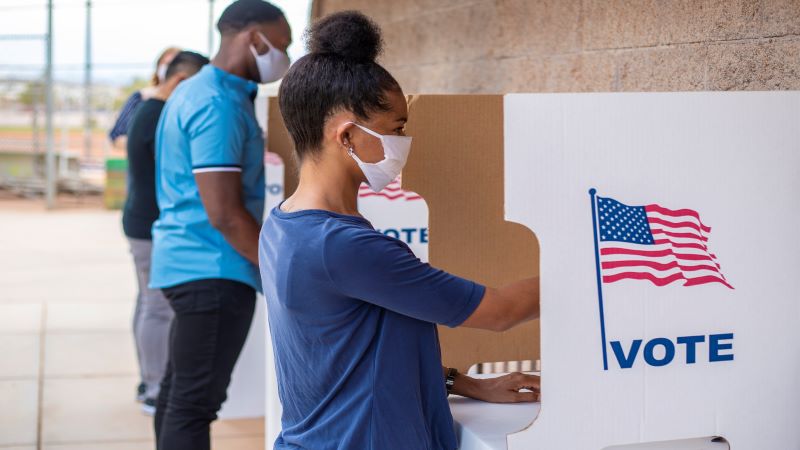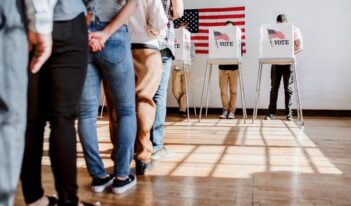
Some state lawmakers aim to give elected officials control over election administration and outcomes.
At last count, 18 laws have been passed in 30 states that make it more difficult to vote. According to the Brennan Center, “more than 400 bills with provisions that restrict voting access have been introduced in 49 states in the 2021 legislative sessions.” Many of these restrictions directly implicate the casting of ballots; others have a more indirect effect on voting. Some laws are uniformly restrictive; others restrict voting in some ways and expand it in others.
Altogether, these bills have prompted lawsuits, congressional hearings, corporate condemnation and a boycott, public outrage and protest, absconding state legislators, and memories of Jim Crow.
Much of the criticism levied at these bills has focused on the ways that they aim to restrict voters from casting ballots in 2022 and beyond. Perhaps of equal import are the ways that these bills aim to restrict election administrators from doing their job in 2022 and beyond. Some of these bills seek to minimize the authority of election administrators––people whose job depends on getting the vote count right––and expand the authority of elected officials––people whose job depends on winning the vote. Never mind depressing voter turnout by a couple of percentage points when you can just certify whatever winner you prefer!
America’s redistricting process has been criticized as one where the politicians get to choose their voters instead of the other way around. In one case, for example, a court held that legislators targeted certain voters—in that case, African Americans—with “almost surgical precision.”
The same backward process—elected officials choosing their voters instead of vice versa—could also describe recent attempts to politicize the administration of elections. And in the extreme, the politicization of elections could remove voters from the equation altogether.
Consider the following three bills.
- Georgia’s Senate Bill 202—signed into law on March 25, 2021—authorizes the state legislature to appoint a majority of the state elections board’s members, and it empowers the state board to remove and temporarily replace local election superintendents who are responsible for certifying election results.
- Texas Senate Bill 1—adopted by the Texas House on August 27—would make it a felony to distribute vote-by-mail applications to voters who do not request them, and it would subject poll workers to jail time if they enter false information on a provisional ballot or remove a partisan poll watcher from a polling station.
- Arizona House Bill 2720—introduced by Arizona state legislator Shawnna Bolick (R. District 20) in May 2021—would allow the state legislature, by simple majority vote, to revoke the Secretary of State’s certification of a presidential election and to choose the state’s presidential electors unilaterally, regardless of the preferences of Arizona’s voters.
Each of these bills could allow election administration decisions that are normally insulated from state-level politics to be exposed to strong partisan winds.
Despite a long history and culture of partisan election administration, post-2020 attempts to politicize local decisions about voter eligibility and precinct-level vote certifications are unprecedented. The fallout has already begun as scores of election officials are resigning in the face of death threats for their past work and potential criminal penalties for their future service. If these roles are filled by diehard partisans, the mission of politicizing election administration would be accomplished without further interventions.
Finding the right balance between political accountability and efficient, legitimate, and neutral expertise in the administration of government programs is always challenging. Unfortunately, these decisions about delegation and oversight are too often based on a determination of political expediency and not effective public administration. The administration of elections is no different, although it should be.
Elections are not a typical government program. By politicizing election administration, state lawmakers are unlikely to increase accountability in the face of controversial decisions. Setting aside the complexity of political accountability as a general matter, it is not likely that state legislators will face heat for their controversial election-related decisions when the very purpose of those controversial decisions is to insulate them from political accountability.
The spate of restrictions on both voting and election administration is motivated by similar concerns related to partisanship and racial prejudice. It remains unclear whether voter restrictions will result in voter suppression. The empirical literature is mixed because restrictions often target individuals who are unlikely to vote in the first place and might instigate countermobilization that offsets the effects of these restrictions.
It also remains unclear how aggressively state legislatures will take over the administration of elections and whether the most serious encroachments on local control such as criminal sanctions on poll workers and the revocation of duly certified vote totals, will garner enough support to be enacted into law.
What is clear, however, is that focusing only on the Constitutionally prescribed “times, places, manner” of voting risks misses the forest for the trees in understanding how alarming these election reform bills are for the future of democracy. Pretending that the politicization of America’s election administration will enhance its legitimacy and accountability is not only naïve, it is dangerous.
This essay is part of a seven-part series, entitled Regulating Elections in the United States.




